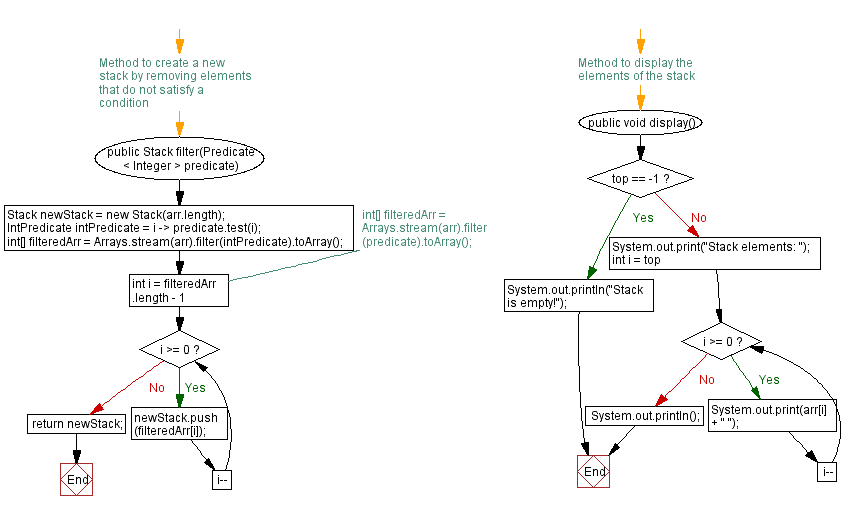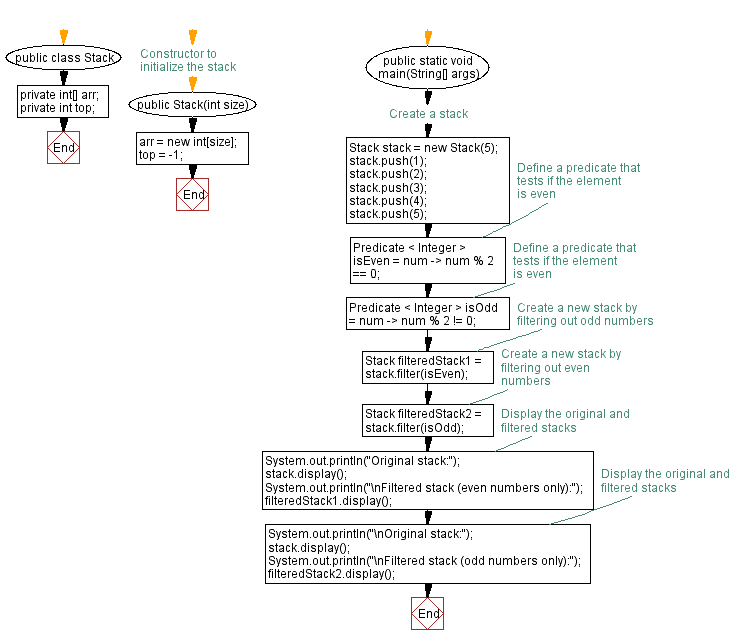Java: Remove elements from a stack that do not meet a condition
28. Create a new stack by removing elements that don't satisfy a condition.
Write a Java program that implements a stack and create a new stack by removing elements that do not satisfy a condition.
Sample Solution:
Java Code:
import java.util.*;
import java.util.function.Predicate;
import java.util.Arrays;
import java.util.function.IntPredicate;
public class Stack {
private int[] arr;
private int top;
// Constructor to initialize the stack
public Stack(int size) {
arr = new int[size];
top = -1;
}
// Method to push an element onto the stack
public void push(int num) {
if (top == arr.length - 1) {
System.out.println("Stack is full");
} else {
top++;
arr[top] = num;
}
}
// Method to pop an element from the stack
public int pop() {
if (top == -1) {
System.out.println("Stack Underflow");
return -1;
} else {
int poppedElement = arr[top];
top--;
return poppedElement;
}
}
// Method to get the top element of the stack
public int peek() {
if (top == -1) {
System.out.println("Stack is empty");
return -1;
} else {
return arr[top];
}
}
// Method to check if the stack is empty
public boolean isEmpty() {
return top == -1;
}
// Method to get the size of the stack
public int getSize() {
return top + 1;
}
// Method to create a new stack by removing elements that do not satisfy a condition
public Stack filter(Predicate < Integer > predicate) {
Stack newStack = new Stack(arr.length);
IntPredicate intPredicate = i -> predicate.test(i);
int[] filteredArr = Arrays.stream(arr).filter(intPredicate).toArray();
//int[] filteredArr = Arrays.stream(arr).filter(predicate).toArray();
for (int i = filteredArr.length - 1; i >= 0; i--) {
newStack.push(filteredArr[i]);
}
return newStack;
}
// Method to display the elements of the stack
public void display() {
if (top == -1) {
System.out.println("Stack is empty!");
} else {
System.out.print("Stack elements: ");
for (int i = top; i >= 0; i--) {
System.out.print(arr[i] + " ");
}
System.out.println();
}
}
public static void main(String[] args) {
// Create a stack
Stack stack = new Stack(5);
stack.push(1);
stack.push(2);
stack.push(3);
stack.push(4);
stack.push(5);
// Define a predicate that tests if the element is even
Predicate < Integer > isEven = num -> num % 2 == 0;
// Define a predicate that tests if the element is even
Predicate < Integer > isOdd = num -> num % 2 != 0;
// Create a new stack by filtering out odd numbers
Stack filteredStack1 = stack.filter(isEven);
// Create a new stack by filtering out even numbers
Stack filteredStack2 = stack.filter(isOdd);
// Display the original and filtered stacks
System.out.println("Original stack:");
stack.display();
System.out.println("\nFiltered stack (even numbers only):");
filteredStack1.display();
// Display the original and filtered stacks
System.out.println("\nOriginal stack:");
stack.display();
System.out.println("\nFiltered stack (odd numbers only):");
filteredStack2.display();
}
}
Sample Output:
Original stack: Stack elements: 5 4 3 2 1 Filtered stack (even numbers only): Stack elements: 2 4 Original stack: Stack elements: 5 4 3 2 1 Filtered stack (odd numbers only): Stack elements: 1 3 5
Flowchart:



For more Practice: Solve these Related Problems:
- Write a Java program to filter a stack using Java streams to create a new stack containing only even numbers.
- Write a Java program to implement a method that traverses a stack and builds a new stack of elements greater than a given threshold.
- Write a Java program to use recursion to remove elements that do not satisfy a condition and return a new stack.
- Write a Java program to create a lambda expression that filters a stack based on a predicate and collects the results into a new stack.
Go to:
PREV : Check if at least one element satisfies a condition.
NEXT : Implement a stack using a linked list.
Live Demo:
Java Code Editor:
Improve this sample solution and post your code through Disqus
What is the difficulty level of this exercise?
Test your Programming skills with w3resource's quiz.
